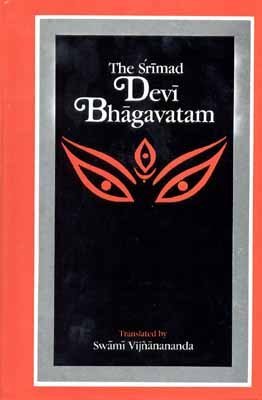The Devi Bhagavata Purana
by Swami Vijñanananda | 1921 | 545,801 words | ISBN-10: 8121505917 | ISBN-13: 9788121505918
The English translation of the Devi Bhagavata Purana. This Sanskrit work describes the Devi (Divine), the Goddess, as the foundation of the world and as identical with Brahman, the Supreme Being. The Devi Bhagavata Purana is one of the most important works in Shaktism, a branch of Hinduism focusing on the veneration of the divine feminine, along w...
Chapter 23 - On the killing of Śaṅkhacūḍa
1-6. Nārāyaṇa said : -- Śiva, versed in the knowledge of the Higher Reality, hearing all this, went himself with His whole host to the battle. Seeing Him, Śaṅkhacūḍa alighted from his chariot and fell prostrate before him. With great force he got up and, quickly putting on his armour he took up his huge and heavy bow case. Then a great fight ensued between
Śiva and Śaṅkhacūḍa for full one hundred years but there was no defeat nor victory on either side. The result was stalemate. Both of them, Bhagavān and the Dānava quitted their weapons. Śaṅkhacūḍa, remained on his chariot and Mahādeva role on His Bull. Hundreds and hundreds of Dānavas were slain. But extraordinarily endowed with divine power, Śambhu restored to life all those of His party that were slain.
7-30. In the meanwhile, an aged Brāhmaṇa, very distressed in his appearance, came to the battlefield and asked Śaṅkhacūḍa, the King of Dānavas :-- “O King! Grant me what I beg of you; you give away in charity all sorts of wealth and riches; give me also what I desire; give me, a Brāhmin, something also. I am a quiet peaceable aged Brāhmin, very very thirsty. Make your Promise first and then I will speak to you what I desire.”
(Note :-- The Brāhmins only are fit for receiving frauds and cheatings.)
The King Śaṅkhacūḍa, with a gracious countenance and pleasing eyes swore before him that He would give him what he would desire.
Then the Brāhmin spoke to the King with great affection and Māyā :-- “I am desirous of your Kavaca (amulet).” The King, then, gave him the Kavaca (the amulet, mantra written on a Bhurja bark and located in a golden cup). Bhagavān Hari (in the form of that Brāhmin) took that Kavaca and, assuming the form of Śaṅkhacūḍa came to Tulasī. Coming there, He made His Māyā (magic) manifest and held sexual intercourse with her. At this time Mahādeva took up the Hari’s trident-aiming at the king of the Dānavas. The trident looked like the Mid-day Sun of summer, flaming like a Pralaya fire. It looked irresistible and invincible as if quite powerful to kill the enemies. In brilliance it equalled the Sudarśan Cakra (disc) and it was the chief of all the weapons. No other body than Śiva and Keśava could wield such a weapon. And everybody feared that but Śiva and Keśava. In length it was one thousand Dhanus and in width it was one hundred hands. It seemed lively, of the nature of Brahmā, eternal and not capable to be noticed, whence and how it proceeded. The weapon could destroy, by its own free Līlā (Will) all the worlds. When Śiva held it aloft and aiming at Śaṅkhacūḍa, He hurled it on him, the King of the Demons quitted his bows and arrows and with mind collected in a yoga posture, began to meditate on the lotus-feet of Śrī Kṛṣṇa with great devotion. At that moment, the trident, whirling round fell on Śaṅkhacūḍa and easily burnt him and his chariot to ashes. He, then assuming the form of a two-armed Gopa, full of youth, divine, ornamented with jewels, holding flute, mounted on a Divine Chariot, surrounded by koṭis and koṭis of Gopas who came there from the region of Goloka, whose bodies were built up of excellent jewels, and Śaṅkhacūḍa then went up to the Heavens (Goloka, where Śrī Brindābana is located in the middle). He went to Vrindāban, full of Rāsas (sentiments) and bowed down at the lotus feet of Rādhā Kṛṣṇa with devotion. Both of them were filled with love when they saw Sudāmā, and, with a gracious countenance and joyful eyes, they took him on their laps. On the other hand the Śūla weapon came with force and gladness back again to Kṛṣṇa. The bones of Śaṅkhacūḍa, O Narada! were transformed into conch-shells. These conch-shells are always considered very sacred and auspicious in the worship of the Devas. The water in the conch-shell is also very holy and pleasing to the Devas. What more than this, that the water in the conch-shell is as holy as the water of any Tīrtha. This water can be offered to all the Gods but not to Śiva. Wherever the conch-shell is blown, there Lakṣmī abides with great pleasure. If bathing be done with conch-shell water, it is equivalent to taking bath in all the Tīrthas. Bhagavān Hari resides direct in the conch-shell. Where Śaṅkha is placed, there Hari resides. Lakṣmī also resides there and all inauspicious things fly away from there. Where the females and Śūdras blow the Śaṅkhas, Lakṣmī then gets vexed and, out of terror, She goes away to other places. O Nārada! Mahādeva, after killing the Dānava, went to His own abode. When He gladly went away on His Vehicle, on the Bull’s back, with His whole host, all the other Devas went to their respective places with great gladness. Celestial drums were sounded in the Heavens. The Gandharbas and the Kinnaras began to sing songs. And showers of flowers were strewn on Śiva’s head. All the Munis and Devas and their chiefs began to chant hymns to Him.
Here ends the Twenty-Third Chapter of the Ninth Book on the killing of Śaṅkhacūḍa in Śrī Mad Devī Bhāgavatam of 18,000 verses by Maharṣi Veda Vyāsa.
